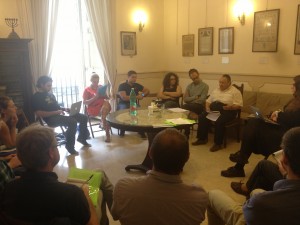LEADERS Jewish European Youth Gathers in Naples
 By Francesca Matalon
By Francesca Matalon
“At the present state of the process of integration analyzed in the past two days, what role should European organizations play?” Jonathan Chaloff, from the International Migration Division of the Organisation for Economic Co-operation and Development (OECD) chose this question as an open end of J-Yes // Jewish Youth European Summit, the seminar organized in Naples by the Union of Italian Jewish Students (UGEI) and the European Union of Jewish Students (EUJS).
“Being a small group of students and young professionals, active in student unions all over Europe is very meaningful and is an opportunity for everyone to contribute their particular perspective”, said UGEI President Simone Disegni welcoming the participants coming from many different Italian cities as well as from Austria, Belgium, the UK, Poland and Norway.
Managing integration and cultural diversity in Europe, from the perspective of the Jewish minority was the focus of the three-day seminar, while enjoying a warm Shabbat in the beautiful Napolitan Jewish community center. “The gap between the real number of immigrants in a country and the number that is perceived by the citizens is an important factor: the perceived number is usually much higher and it is possible to explain this with exploitation for political reasons”, Chaloff explained in his lecture on Immigration and Integration in Europe, giving key facts, trends and numbers. Led by Chaloff the group tried to answer a key question: What is the real condition of immigrants and who are they? Thanks must be given to the input from the participants who gave an overview about each country.
A Jewish perspective about life in a multi-cultural society was then the topic of the lecture of Rabbi Umberto Piperno, stressing how fear represents the key factor, a feeling more and more common in today’s society.
Models of Integration in Europe, what worked and what went wrong – this was the main topic of the third part of the day, with a lecture by Ben Gidley, of the Centre of Migration, Policy and Society of the University of Oxford.
Shabbat was then the central moment of real confrontation and debate among the participants so as to deeply understand the realities of different countries, including the reports of the young leaders about Jewish life in their own country and the initiatives of student unions in regards to the phenomena of racism and xenophobia. If in France with the Front National gathering more and more consent and aiming for the presidency in the 2017 elections, even the most optimistic feel the danger and the Jewish community being affected by rising emigration. In the UK students are involved in fighting the BDS movement becoming stronger and stronger on campuses. Poland is currently experiencing a great revival of Jewish life especially among young people. Worries preoccupies those from Norway where the number of episodes of violence against Jews is high and Hungary were the far right Jobbik party is gaining growing influence. A delicate situation exists in Slovakia, with an extremely small Jewish population, and in Austria where many Eastern European Jews come as a transitional community before making Alyah.
The second part of the program was focused on working on proposals to be presented at the OECD Conference on anti-Semitism, which will take place next November in Berlin in the context of the Civil Society Forum. J-Yes participants are invited to form a delegation of Jewish students that will have the opportunity to address governments directly. Three main issues were discussed in small groups: Holocaust denial and historical revisionism, hate speech on the Web, and the relation between anti-Semitism and anti-Zionism.
There was a lot of input and ideas “That were only the beginning of team work to finalize the proposals and present new ones for young people to be a source for inspiration and innovation,” said EUJS president Jane Braden-Golay.
